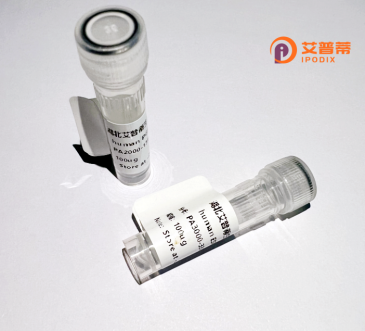
| 纯度 | >90%SDS-PAGE. |
| 种属 | Human |
| 靶点 | NFIL3 |
| Uniprot No | Q16649 |
| 内毒素 | < 0.01EU/μg |
| 表达宿主 | E.coli |
| 表达区间 | 1-462 aa |
| 活性数据 | MQLRKMQTVK KEQASLDASS NVDKMMVLNS ALTEVSEDST TGEELLLSEG SVGKNKSSAC RRKREFIPDE KKDAMYWEKR RKNNEAAKRS REKRRLNDLV LENKLIALGE ENATLKAELL SLKLKFGLIS STAYAQEIQK LSNSTAVYFQ DYQTSKSNVS SFVDEHEPSM VSSSCISVIK HSPQSSLSDV SEVSSVEHTQ ESSVQGSCRS PENKFQIIKQ EPMELESYTR EPRDDRGSYT ASIYQNYMGN SFSGYSHSPP LLQVNRSSSN SPRTSETDDG VVGKSSDGED EQQVPKGPIH SPVELKHVHA TVVKVPEVNS SALPHKLRIK AKAMQIKVEA FDNEFEATQK LSSPIDMTSK RHFELEKHSA PSMVHSSLTP FSVQVTNIQD WSLKSEHWHQ KELSGKTQNS FKTGVVEMKD SGYKVSDPEN LYLKQGIANL SAEVVSLKRL IATQPISASD SG |
| 分子量 | 51.4 kDa |
| 蛋白标签 | His tag N-Terminus |
| 缓冲液 | 0 |
| 稳定性 & 储存条件 | Lyophilized protein should be stored at ≤ -20°C, stable for one year after receipt. Reconstituted protein solution can be stored at 2-8°C for 2-7 days. Aliquots of reconstituted samples are stable at ≤ -20°C for 3 months. |
| 复溶 | Always centrifuge tubes before opening.Do not mix by vortex or pipetting. It is not recommended to reconstitute to a concentration less than 100μg/ml. Dissolve the lyophilized protein in distilled water. Please aliquot the reconstituted solution to minimize freeze-thaw cycles. |
以下是关于NFIL3(核因子白细胞介素3调节因子)蛋白的3篇代表性文献摘要概述:
---
1. **"The transcription factor NFIL3/E4BP4 regulates the developmental onset of NK cell competence"**
- **作者**: Gascoyne DM et al. (2011)
- **摘要**: 研究揭示了NFIL3在小鼠自然杀伤(NK)细胞发育中的关键作用,发现其通过调控NK细胞成熟相关基因的转录,影响免疫系统早期抗病毒和抗肿瘤能力。
2. **"Nfil3/E4bp4 controls B cell immunity via regulation of B cell receptor signaling pathway"**
- **作者**: Kamizono S et al. (2009)
- **摘要**: 本文发现NFIL3通过调节B细胞受体(BCR)信号通路相关基因的表达,影响B细胞分化和抗体产生,为NFIL3在适应性免疫中的作用提供了机制解释。
3. **"The basic leucine zipper transcription factor NFIL3 directs the development of a unique innate lymphoid cell subset in the gut-associated lymphoid tissue"**
- **作者**: Yu X et al. (2013)
- **摘要**: 研究表明NFIL3调控肠道固有淋巴样细胞(ILC3)的发育,揭示其通过协调肠道微生物群与宿主免疫系统的互作维持肠道稳态,并影响炎症性疾病的发生。
---
以上文献涵盖NFIL3在天然免疫(NK细胞)、适应性免疫(B细胞)及黏膜免疫(肠道ILC3细胞)中的功能,反映其多效性调控机制。如需特定研究方向文献,可进一步补充说明。
Nuclear factor interleukin-3-regulated protein (NFIL3), also known as E4BP4. is a transcription factor belonging to the basic leucine zipper (bZIP) family. It plays pivotal roles in immune regulation, circadian rhythm control, and cellular development. NFIL3 binds to specific DNA sequences via its bZIP domain, modulating the expression of target genes involved in cytokine signaling (e.g., IL-12. IL-15), lymphocyte differentiation, and apoptosis. Notably, it is essential for the development of natural killer (NK) cells, CD8α+ dendritic cells, and certain regulatory T-cell subsets, linking it to both innate and adaptive immunity.
NFIL3 also interacts with the circadian clock machinery, synchronizing immune responses with daily cycles. Dysregulation of NFIL3 has been implicated in inflammatory diseases, autoimmune disorders, and cancer. For instance, altered NFIL3 activity affects gut microbiota homeostasis, influencing inflammatory bowel disease (IBD) progression.
Recombinant human NFIL3 protein, produced via engineered expression systems (e.g., E. coli or mammalian cells), enables mechanistic studies of its DNA-binding properties, interaction partners, and regulatory pathways. Its purified form is critical for in vitro assays, structural studies, and drug discovery targeting NFIL3-related pathologies. Research on recombinant NFIL3 continues to uncover its therapeutic potential in balancing immune responses and treating circadian-related diseases.
×